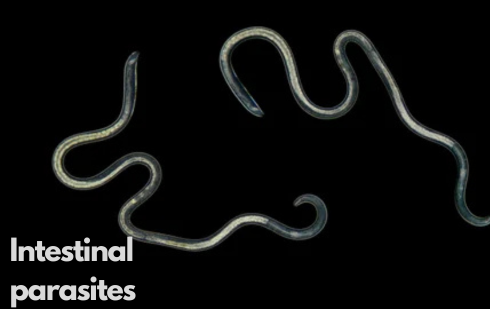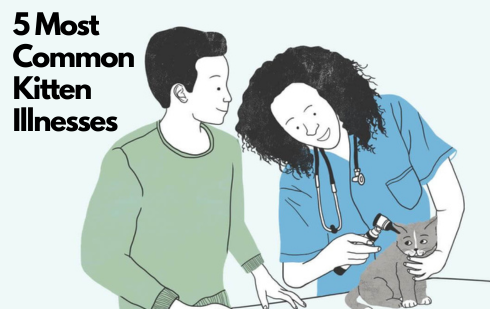5 Most Common Kitten Illnesses: Generally, a healthy kitten is perfect for adoption, but kitten illnesses can appear even in otherwise healthy-looking kittens. Some ethical pet owners take in sick kittens with hopes of nursing them back to health, while others have their seemingly healthy kittens develop a problem soon after coming home.
Kitten illnesses are quite common and may include respiratory infections, parasitic infestations, and digestive problems. Being cognizant of the common kitten illnesses and knowing what to look out for will help owners catch the ailment early, so their kittens get the necessary medical attention and make a proper recovery. It really does make all the difference knowing the common kitten illnesses.
5 Most Common Kitten Illnesses are as under:
Here are 5 common kitten illnesses to watch for: Upper respiratory infections, Ear mites, Intestinal parasites, Fleas, Diarrhea Understanding these can help you identify and address your kitten’s health issues early.
1. Upper respiratory infections:Kitten Illnesses

Upper respiratory infections are one of the most prevalent and common health problems veterinarians diagnose in young kittens. Typically, it is a highly contagious problem which can spread rapidly among kittens, especially when there are several animals in a small space.
The symptoms include sneezing, runny eyes and nose, lack of appetite, and lethargy. While adult cats can also become infected, kittens are much more susceptible and typically experience much greater symptoms, especially when faced with stressful or overcrowded living environments.
Most kittens with a URI will recover in one to two weeks with proper nursing care. But she should also make sure the kitten rests enough, motivate her to take food and fluids, and gently wash away discharges from her nose and eyes by a warm, wet cloth.
However, in case the kitten fails to take food or fails to improve, it’s essential that a veterinarian be consulted. A veterinarian can evaluate the condition and may require further treatment to help the kitten fully recover.
2. Ear mites:Kitten Illnesses

Ear mites are a common problem in kittens, but can occur in cats of any age. These tiny parasites are highly contagious and can spread from one cat to another and occasionally to dogs. The most pronounced sign of an ear mite infestation is black or brown discharge in the kitten’s ears that resembles coffee grounds.
Kittens with ear mites experience itching, and chronic scratching can lead to sores and inflammation around the head and neck.Though over-the-counter medications exist, consulting a veterinarian would be the best course of action to determine an accurate diagnosis.
A quick test can confirm whether ear mites are behind the symptoms, and the vet can prescribe a medication that eliminates the mites with one application. To avoid re-infestation, all pets in the household should be treated. Cleaning the environment is also important to eradicate any remaining mites.
3. Intestinal parasites:Kitten Illnesses

Intestinal parasites are found in many kittens, and roundworms and hookworms are the most common ones. Kittens usually get infected by these parasites when still young, perhaps even soon after birth, by the milk from their mother or due to contaminated places. Other parasites may include tapeworms, Coccidia, and Giardia.
These can be found through a fecal examination from a veterinarian using a microscope. Based on the findings, the vet will prescribe a deworming medication tailored to the specific parasite. Multiple dosages are usually given as most times it takes several doses to fully dislodge the worms completely.
Fecal exams and deworming should be done periodically for kittens to ensure health. If left unchecked, these parasites can cause serious health issues.
4. Fleas :Kitten Illnesses

While common, this can be a particularly challenging occurrence in kittens. Kittens who are infested with a heavy flea population may develop anemia from the blood loss, and fleas may act as vectors for Bartonella and Mycoplasma infections. Medications will be needed to eliminate the fleas, and these must be used at a potency approved for use in kittens on a regular basis, ideally monthly.
All susceptible pets in the household should be treated, and environmental controls are necessary, such as vacuuming floors, rugs, and upholstery, as well as laundering bedding. Your veterinarian can recommend the safest and most effective flea prevention based on your kitten’s specific needs.
Regular flea control is crucial to avoid health complications for young kittens.
5. Diarrhea :Kitten Illnesses

Diarrhea in kittens can result from a transitory cause such as stress or dietary alteration to something more serious like infection, parasite infestation, or immunological disorder. These kittens may present with temporary diarrhea, which resolves with symptomatic therapy, usually returning to their previous diet or receiving probiotics. Persistent or severe diarrhoea, however, may be a sign of more serious underlying disease, and the kitten should be examined by a veterinarian.
Other health issues that may be encountered by kittens include Feline Infectious Peritonitis (FIP), Feline Leukemia Virus (FELV), Feline Immunodeficiency Virus (FIV), and Feline Panleukopenia. FIP is fatal, while FELV and FIV are severe illnesses; Panleukopenia is less common due to vaccination but still a risk if the kitten has not been vaccinated. It causes diarrhea, vomiting, and lethargy, and is very fatal.
Newly adopted kittens should come in to have a physical exam, diagnostic tests, and a plan for vaccinations, deworming, and preventive care to ensure long-term health.


